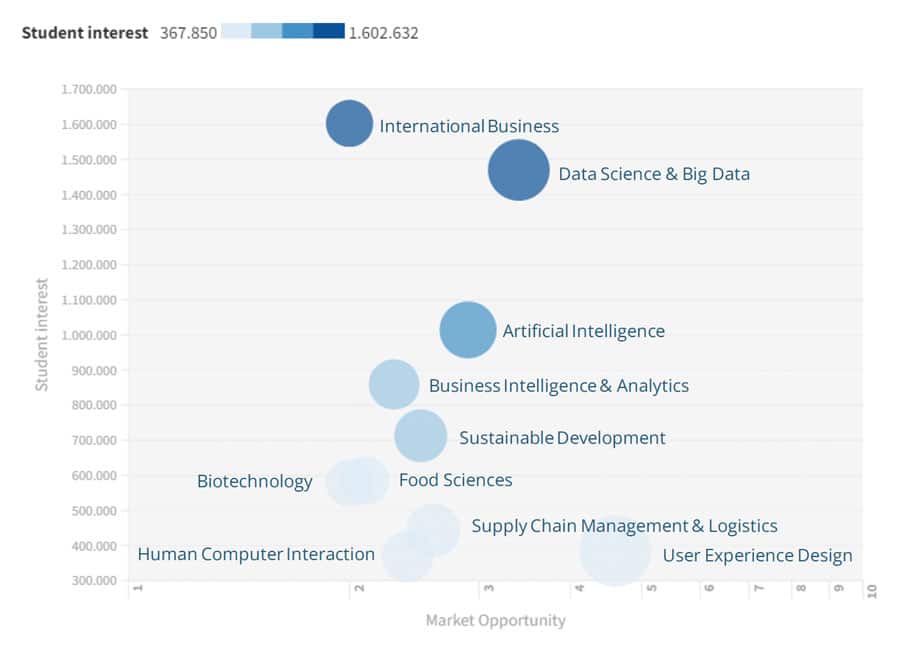New report highlights fields of study with surging international student interest
- A new Studyportals report highlights 10 fields of study where student demand is higher than the supply of programmes in these areas
- It identifies popular destinations for these programmes as well as top sources of demand
- The report also looks at which destination countries are characterised by especially insufficient supply of programmes in certain fields relative to demand for them
A new analysis from Studyportals uses a large volume of student search data to pinpoint significant student interest in certain fields of study. The report identifies the following 10 fields as “subject areas where student interest is growing, and where the global supply of programmes is lagging behind demand.”
- User experience design
- Data science & big data
- Artificial intelligence
- Supply chain management & logistics
- Sustainable development
- Human computer interaction
- Business intelligence & analytics
- Food sciences
- Biotechnology
- International business
User experience design, in particular, is rising in popularity: student interest in this field has grown by 400% over the past four years, according to the Studyportals analysis.

About the data
To determine these fields, Studyportals used two metrics: student pageviews on Studyportals as well as “the number of programmes linked to each of the 245 subdisciplines on our portals.” The company underlines the relevance of this analysis by pointing out that 52 million prospective students from 110 countries search on Studyportals annually, and that roughly “90% of all English-taught programmes in the world are listed on Studyportals.”
The 10 fields of study are essentially those where demand for bachelor’s and master’s programmes is higher than available supply. Student search behaviour on Studyportals indicates demand for programmes 12–24 months before students enrol, given that this is the average period of time of the overall student journey from researching study abroad (i.e., on Studyportals) to eventual enrolment.
Studyportals notes a specific way that universities could use the new data: “There is a lag between when the first universities introduce these courses, and when they become more mainstream. It is that lag, when student interest is rising, that can and should be shortened.”
Countries with the most student demand
In some cases, the Studyportals report indicates top origin countries for demand for certain programmes. For example:
- Artificial intelligence: Ukraine, Sri Lanka, Bangladesh, Vietnam and Nigeria;
- Supply chain management & logistics: India, Nigeria, Bangladesh, Pakistan and Iran, followed by Sri Lanka, Ghana, Germany, Turkey, and the US;
- Biotechnology: Sri Lanka, Iran, Pakistan, Bangladesh, Nepal and Ghana;
- International business: India, Nigeria and Bangladesh.
Countries attracting the most demand
For some programmes, the report identifies destination countries attracting the most demand. For example:
- When searching for artificial intelligence programmes, students are looking especially at studying in Canada, Germany, the UK, and Italy.
- Students interested in the field of human computer interaction are searching the most for programmes in Germany, Canada, the US, and the Netherlands.
- Business intelligence & analytics students express the most interest in Germany and the UK.
- Canada, the US, the UK, and Germany attract the most interest among students searching for food sciences programmes.
- Germany and Italy are the most popular destinations for biotechnology programmes.
- Germany and Canada are the preferred destinations for international business programmes.
Market opportunities
The report indicates where there would be a significant opportunity for educators in certain countries to develop more programmes in specific fields to better meet student demand. For example:
- “Germany has only 2.5% of [biotechnology] programmes but attracts 21% of global interest. Italy has captured 12.7% of interest but supplies only 2% of programmes.
- “Germany attracts 20.5% of the worldwide interest in international business but has only 4.5% of programmes. Canada attracts 8.7% of interest but supplies only 3.3% of programmes.”
For additional background, please see:
















